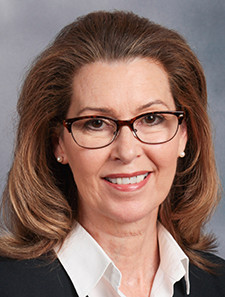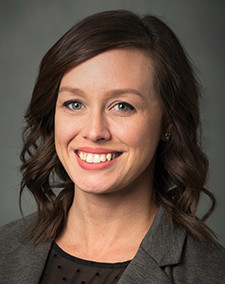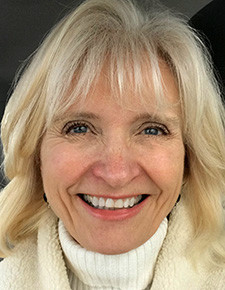
More than a decade ago, when Michele Gran’s son Nick experienced his first episode of psychosis, she and her husband did everything they could to learn how to support him as they came to terms with his diagnosis of schizoaffective disorder.
Anxious and shell-shocked, Gran and her husband sought the best possible care for their then-22-year-old son. “We did everything they say you’re supposed to do,” she said.
Eventually the couple enrolled Nick in a first-episode psychosis treatment program at the University of Minnesota. The program, which provided in-depth support for individuals newly experiencing psychosis, also offered a series of classes for family members designed to help them learn more about their loved ones’ diagnosis.
The family-education program was “10 or 12 weeks long,” Gran recalled. While the information was exceedingly helpful, she said she had a nagging feeling that she still needed something more.
“We knew that when the class was over, we were going to be on our own,” Gran said. She and other parents shared their fears about facing their new reality.
“A few of us looked at each other and said, ‘Now we are better educated about this mental illness, but we’re still traumatized by the diagnosis. Who’s available to help us?’”
One night near the end of the series was particularly hard. The group had been talking about the hereditary aspects of mental illness, and the future felt grim.
“One of the women in the group put her head in her hands,” Gran recalled. “It was winter and it was blizzarding outside. She said, ‘Now we’re supposed to go home?’ I couldn’t help it. I started laughing. I said, ‘Not necessarily. Let’s go find ourselves some beer. Who’s in?’ And that’s what we did. A few of us went out, got a beer and talked about our needs.”
That ad-hoc group eventually morphed into “more of a social-support group,” Gran said. While the group of the parents continued to cover specific topics of interest to their children, like applying for disability benefits, filing for Medical Assistance and looking for group housing, their central focus was on how they could come together to provide emotional support and respite for one another.
The original parent-education program was — and still is — held on the University of Minnesota campus; these days, the ad-hoc group parents’ group meets monthly in a more casual setting.
“We go to Flashback Café at Memory Lanes bowling alley in Minneapolis,” Gran said. “We meet on the third Wednesday of the month. We’re constantly welcoming other parents in to help them understand that there is hope and life for us — even after our children’s diagnosis.”

Nancy Howe
Nancy Howe is another founding member of the first-episode psychosis parents’ group. When her son was a 15-year-old high school student, he was diagnosed with schizophrenia. The experience was painful, and Howe knew instinctively that she had to learn everything she could about her son’s illness. When she heard about the U of M parent-education series, she signed up right away.
“The educational opportunity was a driving force for me,” she said. “At first, the emotional support felt like an added thing. But as time went on, I realized how much I actually needed the support and how much it meant to me.” She began attending the ad-hoc group, and has been a regular participant ever since.
Spending time with other parents who had experienced similar situations was significant, Howe recalled. It didn’t matter if they were talking about their children or not. Just being with other people who had lived through similar experiences helped lighten her load.
“It really changed things for me. I felt so much less alone. It was amazing to feel like I could talk with people who really understood what my life was like day-to-day and not have to make any excuses.”
Continuing conversation
Howe feels there is still so much she can learn from other parents’ experience. “When you have a loved one living with psychosis, the best way to respond to the symptoms is often really counterintuitive,” she said. “In the beginning, a big thing was educating myself about how to be supportive to my son and help him in his recovery process. Talking to other parents in the same situation really helped me understand that.”
Looking back on the years since her son’s diagnosis, Howe realizes that the relationships she made in the parents’ group are some of the most significant in her lifetime.
“Some of the moms who were in our original group have become my best friends over the years,’ she said. “We continue to meet and encourage each other and focus on hope. This group has been a tremendous blessing in my life.”
Gran said she feels the same way about her fellow group members. She thinks some of that feeling grew from the intense bond created by common trauma.
“Only one percent of the population deals with the type of things that we deal with on a daily basis,” she said. “No one else can really understand it. Mental illness is very common, but psychosis is uncommon. We are bonded by our life-altering experiences.”
The group has been kept alive by founders like Gran and Howe, and by other early members like Nancy and Dan Young-Dixon, who’ve kept the fire burning, organizing countless events — and steadily inviting more parents to attend.
“They send out the monthly emails,” Howe said. “They have been utterly steadfast in keeping this group going.”
And even though psychosis remains relatively uncommon, the parents’ support group has steadily continued to grow.
“The initial group was about five people,” Gran said. But, because they hoped to provide support to as many parents as possible, founding members worked hard to draw others in: “We kept inviting other people.”
University of Minnesota psychiatry staff continue to mention the group to parents with children enrolled in their Adult Strengths program for people with first-episode psychosis, and they also mention the group on their listserv. In this way, membership has grown steadily.
“We’ve been around for about 10 years,” Gran said. “There are now more than 50 people in the group. Just this year, I hosted the holiday gathering, and around 32 people showed up.”
Impact on the family
For parents, watching as their child experiences the first symptoms of psychosis can be a deeply traumatic experience. Though a young person may give some indication that their mental health is at risk before their first psychotic episode, most families and health care providers dismiss those warning signs as harmless blips or explain them away as symptoms of more harmless issues. When a diagnosis is finally made, parents have to adjust their dreams for their children’s futures.
The progression of Gran’s son’s mental illness was “the classic scenario,” she said. “He was starting to be withdrawn and really out of control. We did not know what to do. During his senior year of high school, everything progressed. Now, looking back on it, if we knew to be looking for mental illness, you could say that was the prodromal stage. But even our family physician at the time wasn’t looking for that.”
When Nick was finally diagnosed, he was in full psychosis. Gran said that she and her husband were shocked and dismayed.
Howe said that learning about her son’s diagnosis “was completely overwhelming. For one thing, we had no history that I knew of in our family of mental illness. I had no frame of reference at all for what I was observing in his symptoms. I had no experience with antipsychotic medications, for instance. Just that part alone was extremely stressful.”

Jewels Lindholm
Many parents of young adults with psychosis struggle with their own mental health in the wake of their children’s diagnoses, said Jewels Lindholm, LICSW, program coordinator and family clinician at the University of Minnesota’s First-Episode Psychosis- Strengths Program. Ad-hoc support groups like Gran and Howe’s can be a significant source of long-term mental wellness for family members.
“Family members tell me that it is helpful to have somebody to talk to that really gets what they are going through,” Lindholm said. “It helps lower their stress level.” And having parents and other loved ones who feel supported in their journey also helps people diagnosed with psychosis see better long-term outcomes, she added.
“From what we know about research on family support in first-episode psychosis, people who have experienced a first-episode of psychosis have better recovery rates when their family members are supported. Not only are groups like this one helpful for family members, they are also directly linked to their loved ones’ recovery.”
Talking to other parents with similar experiences helped Howe develop sound strategies for responding to the queries of concerned — but misinformed — friends and relatives.
“When you have a child or other family member with a new diagnosis, sometimes other people can say things that are not very helpful,” she said. “They don’t mean to be discouraging, but they don’t have a lot of experience in the world of mental illness, and you don’t know what you don’t know.” The support of other parents helped her come up with the right thing to say and build a sense of security that pushed her doubts aside.
“Their support helped me feel much less isolated,” Howe said. “I always knew I could connect with other parents. Having a support group offered a safe space to talk about these issues without being concerned about being judged or criticized by people who don’t understand. Stigma and discrimination are a real thing in our culture. I always knew I could reach out when things got rough.”
There is also the parental impulse to put the needs of a child before one’s own needs. When the focus is completely on a child’s welfare, a parent’s physical and mental health is at risk, Howe said. “I learned that this is one of those situations where you have to put your oxygen mask on first to be able to help your loved one navigate through the world.”
Gran agrees. She said that over the years the group has been a good place to put her situation in context and remember to take time to care for herself.
“Women, especially mothers, historically aren’t all that good at figuring out their own needs,” she said. When the parents’ group first got together, she remembers other mothers just looking at each other and saying, “’I have no bandwidth left. What do we do?’ This,” Gran said, “was when we decided that we would take care of each other.”
To do that, the group planned some meetings around self-care topics.
“We’ve done things like laughing yoga and aromatherapy,” Gran said. “We try to highlight different ways to help parents recover from crisis. That is our purpose. And,” she added with a laugh, “a fair amount of beer drinking goes on, too.”
Building on ‘Strengths’
Building on the University of Minnesota’s grant-funded NAVIGATE program, the University’s Adult Strengths program aims to help people between the ages of 16-45 who have experienced a first episode of psychosis stabilize their condition through intensive treatment and frequent visits with a team of clinicians. A key part of the program is providing support, information and education for family members.
Lindholm runs the parent-education series, which meets weekly three times a year.
“We touch on several different topics related to first-episode psychosis,” she explained. The group curriculum is “written for family members so they can learn about what psychosis is and how they can support their loved ones.”
The series includes time for group discussion but also visits from guest speakers who have done research on topics of interest. One topic Lindholm tries to emphasize is the importance of self-care.
“We look at wellness,” she said. “For example, through M Health-Fairview, we have brought in wellness providers who talk about mindfulness and yoga and supplements and vitamins for mental health and breathing so family members they can learn how to support themselves as they go through a very stressful time.”
Some families keep coming back to the group year after year, Lindholm said.
“They say they continue to come because they find support from this population. The other parents are their tribe. It is like an AA group. It’s the closest thing that exists for them.”

Courtesy of Michele Gran
Michele Gran
Lindholm said she tries to find ways to encourage participants to form bonds outside of the series.
“I purposely leave space at the beginning and end of group where I leave the room and allow family members to chat with each other,” she said. “Hopefully they can connect with one another informally. I want to encourage them to form bonds.”
Gran and Howe’s group is a good example of the bonds that can be formed in the series. While their spinoff has its roots in the formal education group, their own group has expanded to meet their needs as their children have grown.
“Sometimes, when family members have completed this series or have entered what we call a ‘maintenance phase’ of their loved one’s recovery, they don’t find as much impact coming to the formal education group,” Lindholm said. “They would rather go to a place and just hang out with other parents that get it. They are not in crisis anymore. They understand the hospital system. They understand the disorder. They just need to stay connected to parents who understand what they are going through.”
A ‘full-circle moment’
Because they feel so grateful for the support they gained from mental health providers and other parents, both Gran and Howe say they work hard to give back to others whose loved ones have experienced psychosis.
“I use my big mouth and I am out there all the time,” Gran said. She speaks on panels about mental illness, co-leads a NAMI-Minnesota sponsored parent support group about first-episode psychosis and advocates for the rights of people with serious mental illness.
At these events, Nick is often by her side. “Fortunately my son is really willing to talk to people,” Gran said. “He, like me, agrees that we need to advocate for people who don’t have advocates. It’s a calling.”
A few years ago, Howe decided to make a career out of her commitment to helping parents navigate life after their child has been diagnosed with psychosis. As NAMI-Minnesota’s youth and parent program coordinator, she facilitates support groups for family members.
“I decided a few years ago that it was time to take what I’ve learned as a parent and use it to support other families,” Howe said. “I just think it’s a privilege to be able to be with families in that difficult space in those early days It’s a full-circle moment. There’s no question about that.”